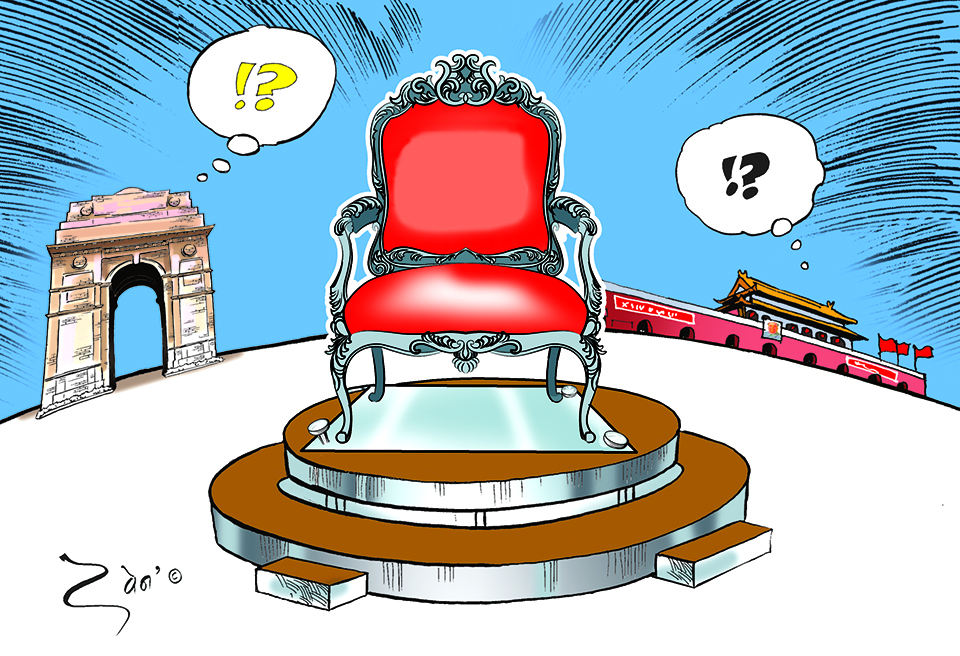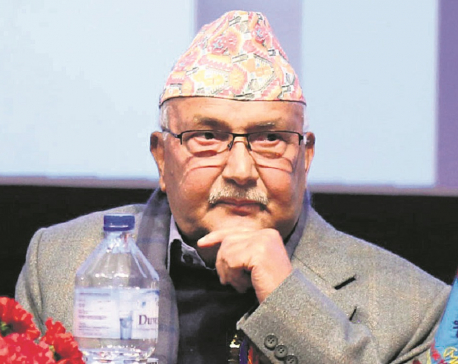
OR


Som P Pudasaini
The author was UNFPA Representative for Sri Lanka & Country Director for the Maldives.som.pudasaini@gmail.com
Oli seems to be laying the groundwork for balancing relations with India and China but how it will play out is yet to be seen
Nepal is passing through a protracted political transition over decades and our economy witnessed dismal growth by any regional or international standards. However, promulgation of the constitution of a federal democratic republic two years ago and completion of elections at the end of 2017 has raised some hopes for political stability.
But this expectation is for a meaningful stability, the one that delivers better economic growth, employment, education, health, infrastructures and good governance. The possibility of a stable government for five years, unlike the one that lasted for nine to 12 months in the past, has raised fresh hope for rapid economic development, particularly among disadvantaged groups. The left alliance which promised of “Golden Era” has won an overwhelming majority in the national parliament and six out of the seven provincial assemblies.
With the appointment of provincial governors, selection of temporary state capitals, oath of state assembly members and ordinance for National Assembly election sorted out, state and national government formation by the left alliance are now on track. However, profound anxiety prevails in the national psyche as to whether the left alliance led by UML and Maoist Center will be able to sort out deep ideological gulf, manage portfolio allocation, pick sound economic agenda and build healthy power-sharing arrangement rising above opportunism, factionalism, massive disrespect for merit and love for corruption. Failing on this won’t ensure political stability and economic well-being.
Geopolitical dilemma
Another matter of concern among both educated and common folks is if left alliance and its government will be able to deal wisely with China, India and other important bilateral and multi-lateral players in the best interest of the nation.
The alliance leaders have reiterated that they are not “anti-India” nor “pro-China” and that the alliance was formed to attain unity among like-minded communists to bring political stability and economic progress aspired by Nepali people.
The Prime Minister in waiting KP Oli dashed to Rashuwaghadi-Kyrong immediately after election accompanied by UML big shots, possibly to assure Nepali people and China that he is eager to implement the 15-point agreement signed by him with Chinese Premier Li Keqiang covering transportation, trade and financial cooperation in the aftermath of 2015 Indian economic blockade.
It was necessary to ensure people that he and left alliance are committed to ensuring alternative transit point and regular supply of petroleum products and essential items from the north. Oli’s earlier stand on this benefitted him and his alliance in the last elections. Alerting the southern neighbor not to ignore him must have been his additional objective as Oli government’s long-term survival depends on Indian goodwill. India seems to be pursuing politico-diplomatic course correction after its post-constitution strategy met with fiasco, including fallout of economic blockade. India won’t be able to achieve this without the cooperation of left alliance, particularly Oli’s.
In this context, Indian Prime Minister Narendra Modi was generous in calling Oli to congratulate him on his and left alliance’s victory almost immediately after the elections. He called Oli again a few days ago to congratulate him for his potential Prime Ministership and invited him to visit India upon assuming the post. Interestingly, the second call came just after Oli’s return from a medical checkup in Bangkok that was extended for a couple of days than planned reportedly for strategizing with key players from the south and/or the north. In return, Modi was also extended invitation to visit Nepal for the third time to visit Janakpur and Muktinath that was denied during his last visit.
On the other hand, China also expects Oli to be true to his earlier commitment to work closely with them. Consequently, President Xi Jinping is reportedly considering undertaking the much-delayed state visit to Nepal possibly in the first half of 2018 if things go right.
So far, Oli seems to be laying the groundwork for balancing Nepal’s relations with India and China in this transitional period before being sworn in as the next Prime Minister. But it is still murky how Indo-China geopolitics and Nepal’s internal political dynamics will be shaped in the months to come. Also, whether Oli and the left alliance will remain firm with both the neighbors in the best interest of our country or compromise as usual for personal or party interests remains a matter of anxiety. Oli and the left alliance’s ability to pragmatically deal with Nepali Congress and Madhesi parties on key agendas of national interest, including consensus-based foreign policy, will continue to be a matter of great concern for all those who desire political stability and economic well-being.
Domestic challenge
Absence of adequate infrastructures, experienced human resources for operationalization of local and provincial governments may become additional challenges for years to come. A lack of clarity of roles of central, provincial and local governments and need to improvise along the way is likely to add further complexity. The cost of building infrastructures and running government at the provincial and local levels are daunting. Federalism will start making sense only if and when service delivery at the lower levels significantly enhances in terms of timeliness and quality to justify the increased cost. It may be important for Nepal to use additional Indian, Chinese and other grants and soft loans in the priority infrastructures and developmental initiatives to strengthen local governance and minimize anxiety to a significant extent.
Essentially, Nepal is in the challenging journey of attaining political stability and rapid economic development through effective implementation of a federalist. People’s mandate must be used judiciously by the concerned leaders and its cadres to build a politically stable and economically prosperous Nepal in the coming five years so that it could be a role model for future leaders to emulate.
Political and diplomatic complexities, infrastructural factors, balancing relation with India and China and relation of left alliance with Nepali Congress and Madhesi parties show that political stability and rapid economic development could still be a much hoped for but an uncertain journey.
The author is a former UNFPA Representative for Sri Lanka and Yemen and Country Director for the Maldives
som.pudasaini@gmail.com
You May Like This

How to judge Oli government?
The longest serving and a stable government post-2008 has failed where it should have succeeded and succeeded where it should... Read More...

Anxiety surrounds (POEM)
Have you ever felt that you lack so much of things in life? People say you are good at... Read More...

Why no one should be ashamed of anxiety disorder
People suffering from an anxiety disorder often think that it is a good idea to hide the illness which is... Read More...





Just In
- CM Kandel requests Finance Minister Pun to put Karnali province in priority in upcoming budget
- Australia reduces TR visa age limit and duration as it implements stricter regulations for foreign students
- Govt aims to surpass Rs 10 trillion GDP mark in next five years
- Govt appoints 77 Liaison Officers for mountain climbing management for spring season
- EC decides to permit public vehicles to operate freely on day of by-election
- Fugitive arrested after 26 years
- Indian Potash Ltd secures contract to bring 30,000 tons of urea within 107 days
- CAN adds four players to squad for T20 series against West Indies 'A'













Leave A Comment